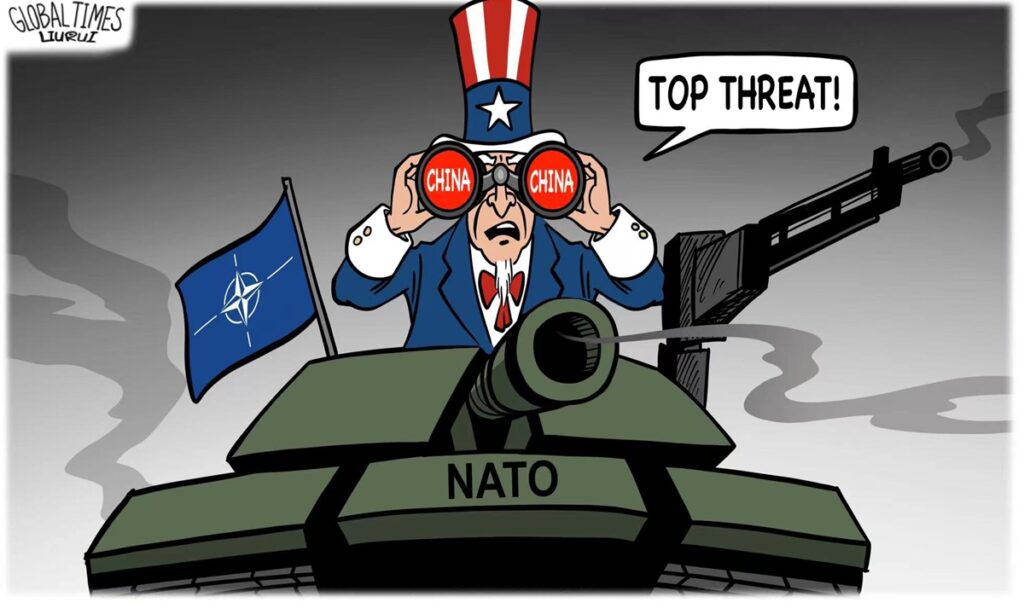NATO is set to hold a summit in Vilnius, Lithuania, next week. As the host country, Lithuania appears both excited and impatient. A significant part of this sentiment is reflected in its provocation of China. At the same time, several other NATO members also appear to have coordinated in their approach to Taiwan island. These have all exposed the coming NATO summit’s malicious intentions toward China. This cannot be ignored by the Chinese people, who must remain vigilant.
About a week before the summit, Lithuania, mimicking the US, announced its so-called Indo-Pacific Strategy. The most eye-catching part of this 16-page “strategy” is its statement on the Taiwan question, emphasizing “the development of economic relations with Taiwan is one of Lithuania’s strategic priorities.” It even shamelessly drew a “red line,” claiming that the status quo in the Taiwan Straits “cannot be changed via the use of force or coercion.”
This is another display of Lithuania’s “tough talk” and arrogance, after the country and Taiwan island mutually established representative offices, which led to a sharp deterioration in Lithuania’s relations with China. If there had been no one to back it up, Lithuania would not have been able to provoke China for this long, nor would it have been so brazen in doing so.
It is bizarre that a Baltic country with a population of less than 3 million, located in the direct radiation zone of the Russia-Ukraine conflict, has come up with an Indo-Pacific Strategy. Many of its wordings for the strategy are familiar, as if they have been directly taken from the US rhetoric toward China, only this time they are being voiced from Lithuania. What is even more jaw-dropping is that Lithuanian foreign minister claimed that “with the Strategy having been approved, Lithuania now finds itself among global leaders.” Only someone completely lacking self-awareness could make such a statement. Lithuania is by no means a “global leader,” but the incident has become one of the biggest international laughing stocks of the year.
Amid the era of great changes, Lithuania’s radical foreign policy is somewhat representative. This Lithuanian government seems to have been gripped by an excessive fear toward Russia, lacking a sense of security, and behaving abnormally. The US and NATO, on the other hand, seem to be the piece of wood that a drowning Lithuania clings onto.
The more the Lithuanian government becomes psychologically dependent on the US and NATO, the stronger impulse it has to take the lead for the US and NATO to prove its own value. The US has repeatedly signaled its support for Lithuania on issues related to China, leading Lithuania all the way into the dark. However, Lithuania fails to realize that it has unwittingly handed over its destiny to others, and fear and unease are the essential sources of energy driving Washington’s geopolitical chariot.
This year’s NATO summit in Vilnius will have distinct differences from previous ones. The small anti-China clique that Washington has cultivated is staging a “public performance” ahead of the NATO summit, displaying radicalism, anxiety, aggression, and impulsive interference in Asia-Pacific affairs. These actions serve as a barometer for this NATO summit and foreshadow NATO’s next moves. While intensifying pressure on Russia, NATO is clearly accelerating its expansion into the Asia-Pacific region. This Vilnius summit may well become a “watershed” moment.
Leaders of the four Asia-Pacific countries – Japan, South Korea, Australia, and New Zealand – that have been labeled as “partners across the globe” by NATO will attend the summit for the second consecutive year. According to Japanese media reports, NATO will elevate its partnership with these four countries to a higher level, giving a strong signal of NATO’s expansion into the Asia-Pacific. Who else is unaware that this is aimed at China? The grand chess game played by NATO and the US is certainly not influenced by Lithuania, which is merely a pawn that has crossed the Rubicon, encouraged and pushed forward without considering retreat, and ultimately unable to turn back.
On the same day Lithuania announced its Indo-Pacific strategy, the UK and Poland signed the 2030 strategic partnership joint declaration, which also meddles in the Taiwan question. Various signs indicate that NATO member countries are further coordinating their positions on the Taiwan question, attempting to form an encircling pattern against China in international public opinion. We must closely observe what kind of consensus will emerge at the Vilnius summit regarding China-related issues and what specific plans will be drawn up. In this regard, we should not merely regard Lithuania as a clown or a joke. Its exaggerated and ugly words and actions are also a window through which the outside world observes NATO, allowing us to be prepared in advance.
(Global Times)




